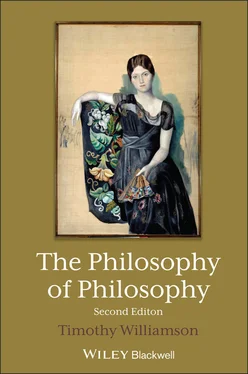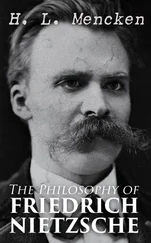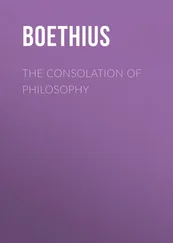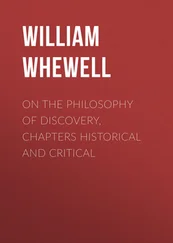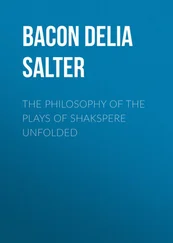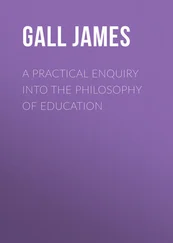Something analogous occurs in the methodology of the natural sciences. We wish to know the value of some physical quantity. We must devise apparatus to measure it. We may find ourselves in disputes over the functioning of different devices. Although the primary question was not about those measuring devices, we cannot answer it adequately without considering them. We need a theory about the relation between the value of the quantity and the representations of it we record when we use our instruments. The scientific investigation of the physical quantity widens to include the scientific investigation of its interaction with our experimental equipment. After all, our apparatus is part of the same natural world as the primary topic of our inquiry.
These analogies make it less surprising that when we try to answer the original question, which is not a question about thought or language, our main task is to adjudicate between rival theories of vague thought and language. A theory of vagueness validates some deduction that concludes with an answer to the original question. That deduction uses but does not mention vague thought or language. It is formulated at the logical level, like the original question itself, not at the metalogical level. But discursively to justify trusting that deduction, rather than one that reaches another conclusion by other rules, one must assess the rival theories of vagueness.
That theories of vagueness conflict in their answers to the original question shows that they are not confined to claims about thought and talk. Theories such as epistemicism and supervaluationism which employ classical logic have ‘Mars was always either dry or not dry’ as a theorem, once they are formulated in a suitably expressive language. To reiterate, that theorem is not about thought or talk.
For the three-valued and fuzzy approaches, the matter is only slightly more complicated. Their proponents assert:
(C) It is indefinite whether Mars was always either dry or not dry.
On those approaches, C does not count as about thought or language. Strictly speaking, however, C does not follow from the three-valued or fuzzy theory of vagueness itself; for all the theory implies, there was never any liquid on Mars, in which case it would always have been either dry or not dry, even by three-valued or fuzzy standards, and so would not have been indefinite. The theory implies only a conditional theorem:
(P1) If it was once indefinite whether Mars was dry then it is indefi- nite whether Mars was always either dry or not dry.
Three-valued or fuzzy theorists can combine P1 with what they regard as an empirical truth about Mars:
(P2) It was once indefinite whether Mars was dry.
From P1 and P2 they use the rule of modus ponens (from “If P then Q” and “P” infer “Q”) to infer C, the answer to the original question. Although their theorem P1 does not answer the question by itself, it is no more about thought or language than C is. Their theories are just as committed as classical ones to making claims that are not about thought or language.
In principle, just as the considerations relevant to adjudicating the dispute between theories of vagueness are relevant to answering the original question, so too may they be relevant to answering a question asked with no philosophical intention, such as “Was Mars always either uninhabited or not dry?,” if it turns out to involve a borderline case. In practice, non-philosophers are often quite content to be told “It’s unclear,” without wondering exactly how that statement addresses the question asked; they simply drop the matter. For their purposes that may be the best thing to do. By contrast, philosophers persist; they want to know at least whether there is a right answer, even if nobody can know what it is. The difference lies not in the content of the original question but in the interests with which it is asked. Those interests can amount to a tissue of associated questions: for our original question as asked by a philosopher, the associated questions query other instances of the law of excluded middle. Given those interests, it is rational to persist with the original question, and not take an unexplained “It’s unclear” for an answer. But we should not underestimate the importance outside philosophy too – in science and even in politics – of sometimes persisting with a straight question, not allowing oneself to be fobbed off with the convenient claim that no practical purpose would be served by answering it. At other times, non-philosophers in effect assume without argument a particular treatment of vagueness (not always the same one), without realizing or caring that there are alternatives. The treatment may be good enough for their purposes, or not.
In this case study, our interest in giving a clear and critically reflective answer to a simple, non-technical, non-metalinguistic, nonmetaconceptual question forced us to adjudicate between complex, technical, metalinguistic, and metaconceptual theories. This phenomenon seems to have been overlooked by those who complain about the “arid” technical minuteness of much philosophy in the analytic tradition. A question may be easy to ask but hard to answer. Even if it is posed in dramatic and accessible terms, the reflections needed to select rationally between rival answers may be less dramatic and accessible. Such contrasts are commonplace in other disciplines; it would have been amazing if they had not occurred in philosophy. Impatience with the long haul of technical reflection is a form of shallowness, often thinly disguised by histrionic advocacy of depth. Serious philosophy is always likely to bore those with short attention-spans. 14
Why should considerations about thought and language play so much more central a role in philosophy than in other disciplines, when the question explicitly under debate is not itself even implicitly about thought or language? The paradigms of philosophical questions are those that seem best addressed by armchair considerations less formal than mathematical proofs. The validity of such informal arguments depends on the structure of the natural language sentences in which they are at least partly formulated, or on the structure of the underlying thoughts. That structure is often hard to discern. We cannot just follow our instincts in reasoning; they are too often wrong (see Chapter 4for details). In order to reason accurately in informal terms, we must focus on our reasoning as presented in thought or language, to double-check it, and the results are often controversial. Thus questions about the structure of thought and language become central to the debate, even when it is not primarily a debate about thought or language.
The rise of modern logic from Frege onwards has provided philosophers with conceptual instruments of unprecedented power and precision, enabling them to formulate hypotheses with more clarity and determine their consequences with more reliability than ever before. Russell’s theory of descriptions showed vividly how differences between the surface form of a sentence and its underlying semantic structure might mislead us as to its logical relations and thereby create philosophical illusions. The development of formal model-theory and truth-conditional semantics by Tarski and others has provided a rigorous framework for thinking about the validity of our inferences. These theoretical advances have enormous intellectual interest in their own right. They may have made it tempting to suppose that all philosophical problems are problems of language: but they do not really provide serious evidence for that conjecture.
To deny that all philosophical questions are about thought or language is not to deny the obvious, that many are. We have also seen how in practice the attempt to answer a question which is not about thought or language can largely consist in thinking about thought and language. Some contemporary metaphysicians appear to believe that they can safely ignore formal semantics and the philosophy of language because their interest is in a largely extra-mental reality. They resemble an astronomer who thinks he can safely ignore the physics of telescopes because his interest is in the extra-terrestrial universe. In delicate matters, his attitude makes him all the more likely to project features of his telescope confusedly onto the stars beyond. Similarly, the metaphysicians who most disdain language are the most likely to be its victims. Again, those who neglect logic in order to derive philosophical results from natural science make frequent logical errors in their derivations; their philosophical conclusions do not follow from their scientific premises. For example, some supposed tensions between folk theory and contemporary science depend on fallacies committed in the attempt to draw out the consequences of common sense beliefs.
Читать дальше
